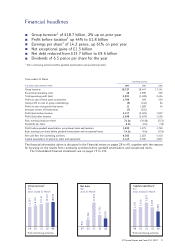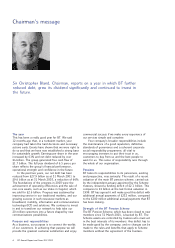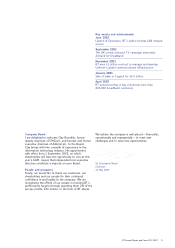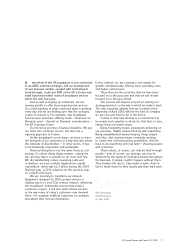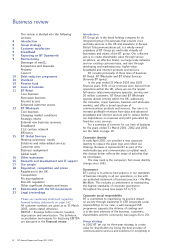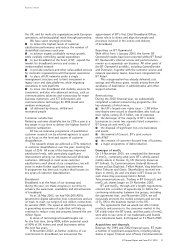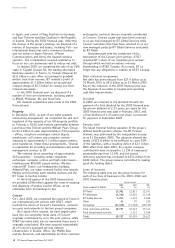BT 2003 Annual Report Download - page 14
Download and view the complete annual report
Please find page 14 of the 2003 BT annual report below. You can navigate through the pages in the report by either clicking on the pages listed below, or by using the keyword search tool below to find specific information within the annual report.
Business review
BT Annual Report and Form 20-F 2003 13
value-added services, with access speeds varying from
512 Kbits to 2 Mbits and with functionality that
enables up to ten PCs to share a single access link.
&By March 2003, we were converting business
customers to broadband at the rate of one line every
minute (based on a 40 hour working week).
&Sales of IP telephone systems increased
substantially. 30% of all the telephone systems now
sold by BT Retail in the SME market are either pure IP
or a hybrid of IP and conventional systems. With the
launch of the Versatility system in November 2002,
BT Retail now offers convergent telephone systems
suitable for all customers, regardless of size.
&To complement the growth in sales of IP-based
network infrastructure, we launched BT Business
Software (a range of messaging and collaboration
tools) and Open Orchard (a new venture offering
software applications and consultancy to
mid-market customers).
&The launch of Mobile Worker in August 2002
was BT Retail’s first offering as a service provider.
It connected 3,500 handsets by the end of March
2003, and we also launched BT Business Mobile,
a bespoke tariff for business customers.
Internet access
At 31 March 2003, BT Openworld had approximately
1.75 million UK consumer and business ISP customers,
making it one of the leading internet access providers
in the UK.
During the year, the rate of growth of internet
penetration in the UK slowed and the narrowband
(dial-up) market showed signs of maturity. Against
this background, BT Openworld’s strategy is to create
a profitable business and drive the growing
broadband market.
BT Openworld’s narrowband business continued
to prove itself to be sustainable and viable.
BT Openworld’s strategy is to increase its profit
from this area, while simultaneously migrating
narrowband customers onto broadband access services.
This strategy is designed to increase revenues and
provide customers with a superior internet experience.
During the year, BT Openworld grew its broadband
customer base by 171% to over 290,000 and it
remains the leading ISP supplier for broadband ADSL
services in the UK.
Enhanced customer access
We continued to use new technology to develop more
effective relationships with customers.
&We remained on track in the development of
next-generation multifunctional contact centres, an
upgrading of the traditional call centre. Eight of
the planned 31 centres in the UK, all of which will
be equipped with state-of-the-art CRM systems, were
completed during the year. Increased efficiencies
achieved cost reductions of £86 million – on track
to reach the target of £150 million annual savings by
the end of the 2004 financial year. The restructuring
was achieved without compulsory redundancy.
Specialist broadband contact centres were set up in
Newcastle and Exeter, and in March 2003 BT Retail
announced that we would be opening new contact
centres in New Delhi and Bangalore.
&During the financial year, we embarked on
a programme to transform and expand our online
relationships with customers. At 31 March 2003,
we had a total of almost four million online
relationships, and over 300,000 customers receiving
e-bills. We continued to extend the range of online
services, particularly those made possible by broadband
and mobile access. This programme made a significant
contribution to our cost reduction achievements in the
2003 financial year.
&Our integrated multi-channel transformation
programme aims to change the way BT Retail serves
major business customers. The programme is focused
on improving the customer experience and reducing
the cost of sale through integrated web and desk-based
access, and on increasing market reach and adding
value through our strategic partners. Significant cost
savings were delivered by deploying online service
support to 500 customers, handling 3,000 transactions
per day by the end of March 2003. The new
tele-channel opened 10,500 new leads, and closed
contracts worth £84 million. Our indirect channel
partners made a significant contribution.
BT Wholesale
Years ended, or as at,
31 March 2003 2002 2001
Group turnover £11,260m £12,256m £11,728m
No. of employees (’000) 27.6 29.8 30.0
Core business
BT Wholesale provides network services and solutions
within the UK, including ADSL, conveyance, transit,
bulk delivery of private circuits, frame relay and ISDN
(integrated services digital network) connections. It
serves more than 500 communication companies, fixed
and mobile network operators, and service providers,
including BT Retail and BT Global Services. It aims to
build complete communications packages and works
with its customers to help them succeed in their
businesses. BT Wholesale has 885 local and trunk
processor units, 119 million kilometres of copper wire
and six million kilometres of optical fibre.
Consistent with our strategy, BT’s UK networks are
now managed by BT Wholesale – this includes the
UK PSTN (public switched telephone network), ATM
(asynchronous transfer mode) and IP networks.
Together, they constitute the most extensive
telecommunications network in the UK, capable of
touching virtually every home and business.
The fact that all UK network capital expenditure
decisions are now made by one team has enabled BT
Wholesale to reduce the capital expenditure it controls
by realising synergies through more efficient network
planning and responding quickly to worsening market
conditions. This is the capital expenditure of
BT Wholesale and of BT Global Services on the UK IP
network, which together has been reduced from
£2,109 million in the 2002 financial year to £1,793
million in the 2003 financial year.


